DIANA KRALL / “Black Crow”
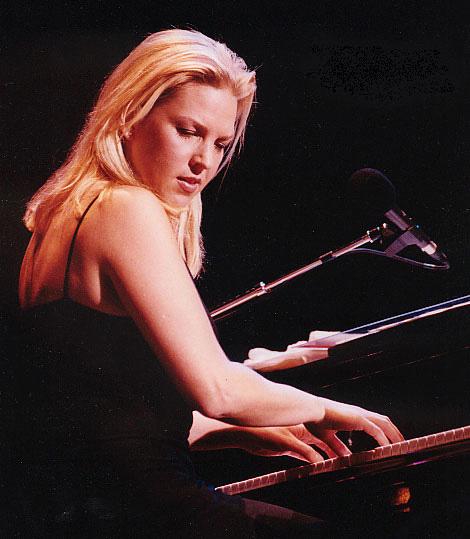
Diana Krall’s “Black Crow” (from The Girl In The Other Room) is so clean and faithful a cover of Joni Mitchell’s original that I’m tempted to describe Krall’s version as more true to the original composition than the original itself. Of course, that makes no sense, but I’m thinking of the way the original begins: Mitchell’s aggressive rhythm guitar, sounding like the soundtrack to someone trying to escape the inescapable; and Larry Carlton’s lead guitar coming in, all squealing feedback and echo. Even before the lyrics begin, the metaphor is set. Someone in pain (the lead guitar) is running (the rhythm guitar). In Krall’s version, the lyrics are the same, but musically, all the sharp edges have been rounded off. The song is still about loneliness, but it’s a kinder, gentler sort of loneliness.
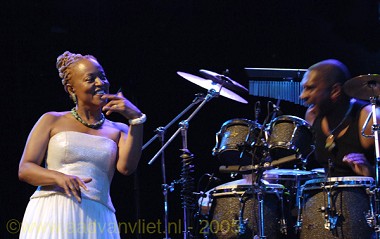
It wasn’t until I listened to Cassandra Wilson’s percussive cover of “Black Crow” (from Blue Light ‘Til Dawn) that I realized the original has no drums. In Wilson’s version, conga drums replace the rhythm guitar; an eerie-sounding reed (Don Byron’s clarinet, maybe?) plays the role of electric guitar. Wilson’s cover brings yet another undertone to the identical set of lyrics.
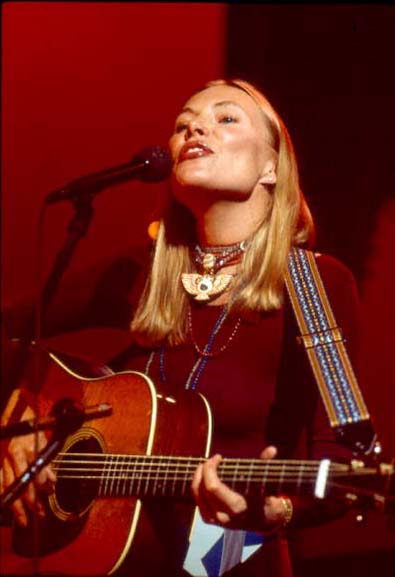
Joni Mitchell’s version (from Hejira) is about an interior flight. It is introspective, philosophical, metaphorical. Listening to it, I think of a lone artist sitting in the back seat of speeding car, gazing out of the window, wondering if the road is worth it, wondering if the wild joy of freedom is worth the homelessness it demands in return. Wilson’s version sounds a good bit more literal. The pounding drums and the sound effects of crickets and birds make me think of blood hounds and river banks. Of chains, guns and Harriet Tubman. I thought too about a tune we posted a few months back—“Amadou Diallo”—that also featured a haunting melody over thudding hand percussion.
Going back to Krall’s cover after the introversion and apprehension of the other two versions, you almost feel a sense of relief. From the first note, Krall’s take on “Black Crow” is stylish, elegant and perfectly rendered. There’s not a note out of place; no one breaks a sweat. It’s gorgeous, if distant. If Mitchell’s original is mournful and Wilson’s cover is tortured, then Krall’s version is wistful. Of the three versions, Diana Krall’s is both the prettiest and my favorite, but only because it’s at least one level removed from the pain the lyrics describe. There’s something inherently disquieting about Mitchell’s image of “a crow flying black and ragged tree to tree,” but Krall’s easy croon and effortless piano playing almost makes it sound like something good.
—Mtume ya Salaam
Taking a crow to the cleaners
Mtume, two quick notes and then I’m off on a tangent of my own.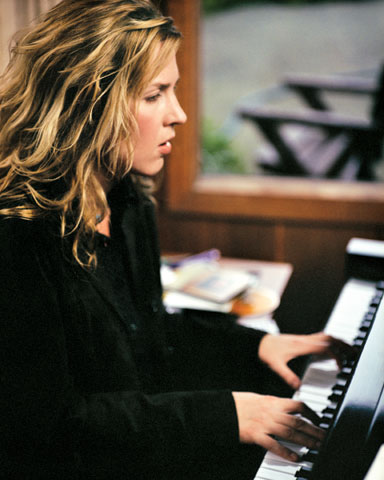
Note one: I agree. I enjoy Krall’s version the best of these three, mainly because Krall does a great job of presenting the narrative of the song. 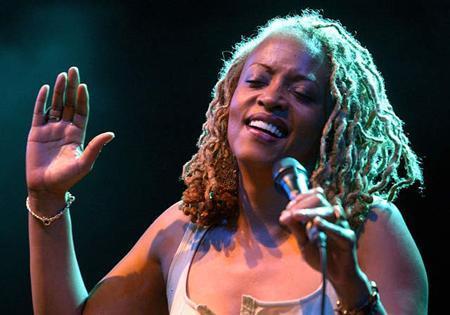
As much as I love Cassandra’s voice, her version sounds like an “art” piece, investigating and improvising based on sound manipulation and almost completely eschewing the song’s storyline. In Mitchell’s version the band and the arrangement dominate, plus the up-tempo fights against the gravity of the song’s content.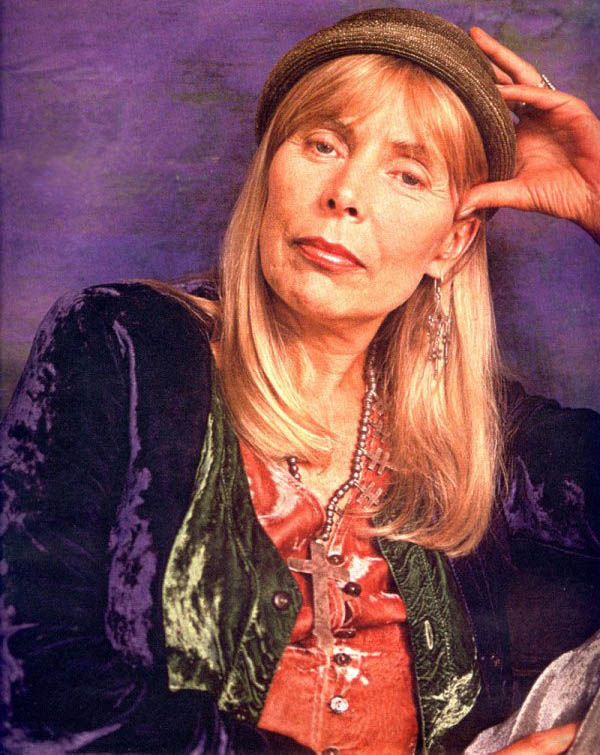
Note two: Mitchell’s live version of “The Dry Cleaner” is the shit. I have known about Mitchell, but never really bothered to listen with open ears. Part of my disinclination is based on a prejudiced aversion to blondes singing Black music. Brazilian music has helped me get over that, but I still have a tendency to look askance, never really taking the time to check them out.
What I hear in both Mitchell and Krall is Black music performed by non-Blacks, and in Mitchell’s case, it’s also Black music composed by a non-Black. Non-Black participation has been a hallmark of jazz from the get-go, and generally speaking I don’t have the same strong aversion when it comes to instrumentalists, but vocalists….
Almost everything we consider American music is rooted in or else deeply influenced by African-derived musics (mainly blues, jazz, gospel, and R&B). On the contemporary set, it’s easy to see the influence of rap; hell, even country and western cats are rapping.
After over 100 years (from ragtime to rap) of Black music serving as the core for popular American music, American music itself is now almost synonymous with musical forms pioneered by Blacks in America.
However, I am not interested in biological essentialism. I listen to my ears. I know what I like and I know why I like what I like, and I also know when someone is doing a good job of working within a particular African-derived musical form. This little discussion is, of course, the tangent I referred to earlier. 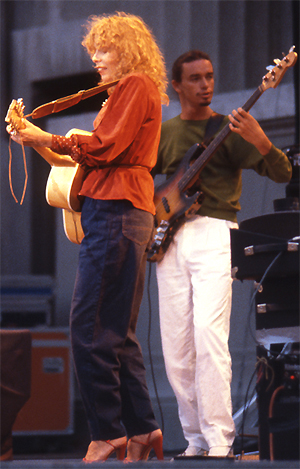
Now back to point two. On “Dry Cleaner” Mitchell is working that Mingus thing. Cassandra is not too shabby in her interpretation, but the band with Mitchell out blows the ensemble accompanying Wilson. Joni tears into the opening verse over a drum who shadows her every twist and turn. I’m pretty sure that’s Jaco Pastorius on bass? I don’t know who the drummer or the saxophonist is, but both of them are doing it full out (the drummer has an especially active kick on the bass drum). It’s a good rendition of Mingus’ music to which Mitchell has fitted lyrics.
I know “Black Crow” is the more popular number and I recognize that Krall’s version is very attractive, nevertheless Mitchell’s live “Dry Cleaner” is the most note worthy in the whole batch. But on the other hand, if you had chosen that one, it could not have been a “cover” song.
—Kalamu ya Salaam
Mitchell can really blow
It is interesting, isn't it, that Cassandra Wilson (the jazz singer) sings "The Dry Cleaner" with a funk feel, while Joni Mitchell (the pop singer) sings "The Dry Cleaner" with a jazz feel? This song really showed me something. I've always respected Mitchell as a lyricist and as a guitarist, but I never realized how skilled a singer she is. It's damn near exhilarating to hear the way Mitchell negotiates the perilous angles and curves of Mingus' melody. I was looking forward to hearing Wilson rip through those notes, but instead, she plays it cool, laying back in the pocket. It was when Wilson declined to attempt that roller coaster ride that I realized Mitchell can really blow.
One other thing. I think the reason Wilson's version is on a funk vibe is because Mitchell's orginal studio version is based on a funk groove rather than the more swing style of the live version. It sounds like Wilson was covering the studio version, not the live version. By the way, the musicians on the studio version are: Herbie Hancock (keyboards), Wayne Shorter (saxophone), Don Alias (percussion), Peter Erskine (drums) and Jaco Pastorious (bass). The players on the live version are: Pat Metheny (guitar), Michael Brecker (tenor saxophone), Lyle Mays (keyboards), Jaco Pastorius (fretless bass), Don Alias (drums). Good call on the Jaco thing, Baba.
—Mtume ya Salaam
the nina simone connection
I was so sure it was Jaco that I posted a photo of Joni and Jaco (see above photo—that's him in the white pants). And guess what? Don Alias was a drummer who worked with Nina Simone; he was used to dropping beats for a sure enough soul singer, a singer who worked the hell out of a drummer; and there you have it kiddies, the ears don't lie...good night and may the sound stay with us.
—Kalamu ya Salaam
This entry was posted on Sunday, September 10th, 2006 at 12:25 am and is filed under Cover. You can follow any responses to this entry through the RSS 2.0 feed. You can leave a response, or trackback from your own site.
2 Responses to “DIANA KRALL / “Black Crow””
September 13th, 2006 at 10:25 am
The sax player is Michael Brecker. Pat metheney was on guitar, Lyle Mays on keyboards. Thanks for the thoughtful post.
January 28th, 2007 at 10:51 am
I have just heard Joni Mitchell’s ‘ Black Crow’ for the first time on BBC Radio 3. The programme was Jazz Legends and was about Jaco Pastorius.
I must admit that I truly love that track. It is superb, and I shall now endeavour to listen to the cover versions by Cassandra Wilson and Diana Krall.
Leave a Reply
| top |